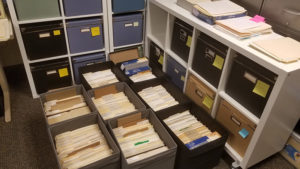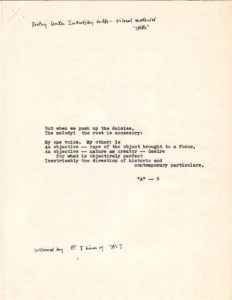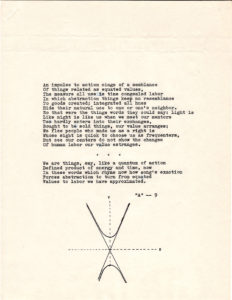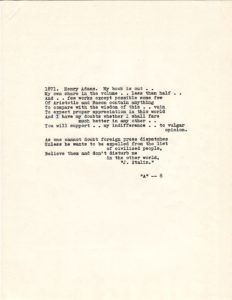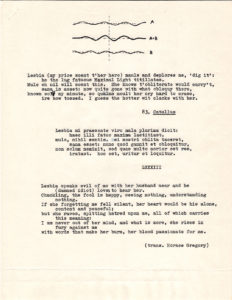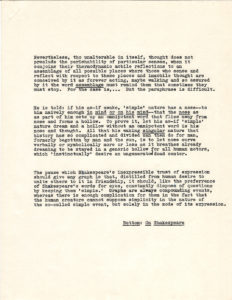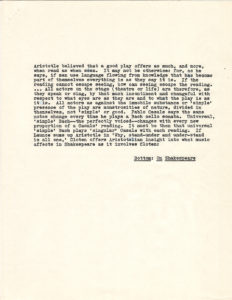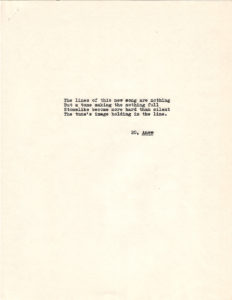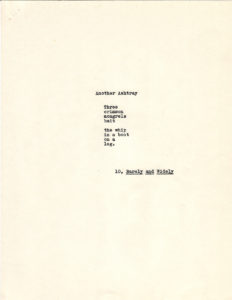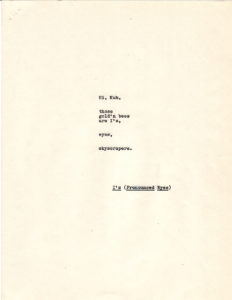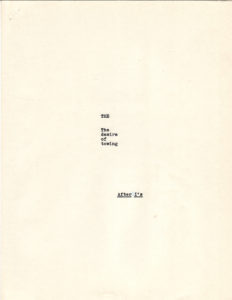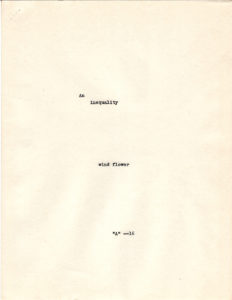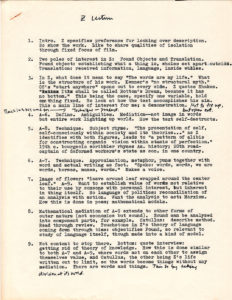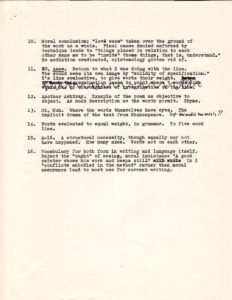As I work through and with my archive, I want to supplement it online to show some highpoints of what I am finding there. The first in my imagined series, as a kind of originary moment, documents my talk on Louis Zukofsky, or better put the talk I hoped to give on his work, at the San Francisco Art Institute on 8 December 1978, the famous evening with Robert Duncan. This event was a watershed in my poetics; the occasion of the splitting of New American communitas from the social formation of Language Writing that ricocheted widely during the following decades; and the first in the series of literary controversies that have marked my work and career. Most recently, the online journal Dispatches from the Poetry Wars obtained and uploaded the tape of the event—which had been circulating since someone reproduced it without permission from the American Poetry Archive at San Francisco State University. The tape itself became the subject of lore and an object of struggle in its own right—a fusion of material text and mythic correspondence all archivists yearn for. What was missing were the images. [Contd. below]
Zukofsky quotes from “A”
Page 2, the first eight lines of “A”–7, has been lost but is necessary in this sequence.
Zukofsky quotes from Catullus and Bottom
It’s important to note that I did not get past the discussion of Catullus, with its “curve fitting” graphic, nor did I get much past number 8 in the lecture below.
Zukofsky quotes from All and “A”—16
BW, “Z Lecture”
[Contd. from above] Finally, over my objections, the tape was made public, and there was nothing to be done. My reasons for objecting to its being uploaded were many: first, the tape is held in an archive and permission is needed for its reproduction and circulation; none was obtained; this is a basic right of authorship and custom of literary courtesy. Rather, there was a snarling assertion that the right of authorship did not obtain in my case. If “the authors are in eternity” and hence property common to all, obtaining and publicizing the tape was a religious propitiation and a sacrificial act in some sense. It was also imagined as a kind of anti-authoritarian politics, but given that the literary authorities recognized in this act of propitiation were Duncan and Zukofsky, that rationale falls apart. More likely, the motivation was to continue the pile-on and shaming I experienced over this event especially during the eponymous Poetry Wars of the 80s; in this sense the tape was a relic in the High Church of poetic priestcraft, and I was being punished as an apostate. Given the infinite interpretability of this event—its allegorical nature—I am somewhat consigned to its deformed reception being a part of literary history, and mine as well. There is Truth in the Event, no matter how distorted, but something is missing. Namely—the content of my presentation on Zukofsky’s work, and its importance for the emerging practice of Language writing, was obstructed, interfered with, kept out of public view.
The recovery of the materials from my archive adds a crucial dimension to what was missing from the tape—the visual texts I carefully prepared and brought to the event. (Also not part of the record is the NET Poetry U.S.A. outtakes, directed by Richard Moore.) I wanted my talk to be both visual and verbal, a performance piece that would be comfortable in a space like 80 Langton Street, where I did present a visual/verbal performance a year later, even as the available technology was primitive: not PowerPoint but an opaque projector of the kind professors suffered with during that period. In retrospective I was giving a PowerPoint on Zukofsky’s work, to supplement my prepared notes, and this challenged certain assumptions of a public literary event in the period. Rather, I was taking the audience to a scene of production, with a reading of Zukofsky as materialist and constructivist to be built from the ground up. To support this reading, I presented carefully selected quotes from “A,” Bottom: On Shakespeare, and Catullus, making a kind of Zukofsky Tool Kit for reassembling the poetics of his work, as my lecture intended. This, in turn, was supported by Zukofsky’s own theoretical work on the analytic use of language as prerequisite for a poetic making in which “the words are my life.” In a precise sense, my reading was diametrically opposed to Duncan’s vatic, holistic, mythic, conservative one.
Above are the missing texts from my presentation. Originally there were twelve sections of text; one ended up on the SFAI auditorium floor, I recall, to be trampled mercilessly. These are followed by my two pages of lecture notes. Due to Robert Duncan’s impatience and interruption, I was only able to present my selections up to the reading of Catullus (including a short piece on the translation I had published in This 4 in 1974; t/k). That was when Duncan could not take it any more—and the reasons, now, seem twofold. First, he believed translation was a kind of immanent continuity between elect souls; in his epic fight with Robin Blaser he had asserted a privilege of the soul in translation. Second, the text I chose to present was certainly sexual and possibly queer; Duncan straight up responded that Zukofsky could not translate Catullus since he could not “enter in” to his sexual passion—Zukofsky comes off as a kind of prude, perhaps. Whether my reading of Catullus has to do with a denial of sexuality or passion is a good question; I would argue for the intellect as a high form of passion, and what Zukofsky wanted with the letter of his translation is informed by the passions in that sense. I present, then, the evidence of the text, in the hope that my reading may now come clear as the equally impassioned source of poetry I wanted to come.
Correspondence
1] Kent Johnson to BW, 2 April 2020: Thanks for that message, where you copied all the people I had copied last night, in somewhat of a meltdown, as I was, over the state of things personal and global, admittedly.
Though they are welcome additions to the archive and lit-historical documents of worth for future researchers, I don’t see that the pages of your LZ notes are all that relevant to the overall dynamics of the Duncan confrontation, frankly. They don’t in any way change the matter of the event, which you quite accurately and simply state is emblematic of the New American / LangPo “Big Split,” which history is showing, I’m afraid, you and associates have lost and increasingly will continue to. You have lost because you forced the split when it wasn’t necessary, historically speaking. Have you not realized this yet?
I hope you and family are well and stay so. Weird and scary times. It’s like the invasion from outer space. The far right-wing of the ruling class may well kill the world, yet. The ironic thing is that the “left wing” of the ruling class (along with the heroic medical scientists and health workers, of course), are the only ones who can bring us out of this. The radical left, helpless, has nothing to do with it. Emergency, Mr. Roberts, emergency . . .
2] BW to Kent Johnson, 2 April 2020: I’m confused. Who is talking about “winning”?
But if you wish, the “material text” was introduced as a poetics in that evening, in opposition or contradiction to immanence, ensouling, the Great Tradition, the canon, and “Presence” in the logocentric sense—all of which Duncan represented.
What follows is four decades where the “material text,” the precedence of the signifier over the signified, had a massive impact on American and even transnational poetics. My archive, for one, shows that decades-long influence.
So—seeing the texts that I brought to the event does change things. It shifts the ground from orality/presence to text/signification, and an entirely different ethics of presentation. Duncan’s “presence” came undone—which he would admit.
The political observations you follow with are, well, what we are immersed in right now. There is no agency there, you are right. Poetry doesn’t “make nothing happen.” It makes something happen in the way that it does—and people die every night for lack of what is to be found there.
The “turn to language,” I would say, is one thing people are dying for the lack of. The disease was, first, a matter of public language before it opened the door to catastrophe.
Notes and links
Note: returning to the evening for Zukofsky is all the more poignant in that Covid has pushed the San Francisco Art Institute to a point of virtually no return. When I took part in the Zukofsky event, an audience of several hundred could be expected for poetry or artist’s talks. My last attendance at the space was a memorial for Bill Berkson. If there is anything capitalism is good for at this point, I hope it comes up with a Hail Mary for SFAI!
Links: Archive 02: Reception Study
Page 04: My Literary Controversies
Entry 34: The Lost America of Love
Entry 33: The Duncan Thing
